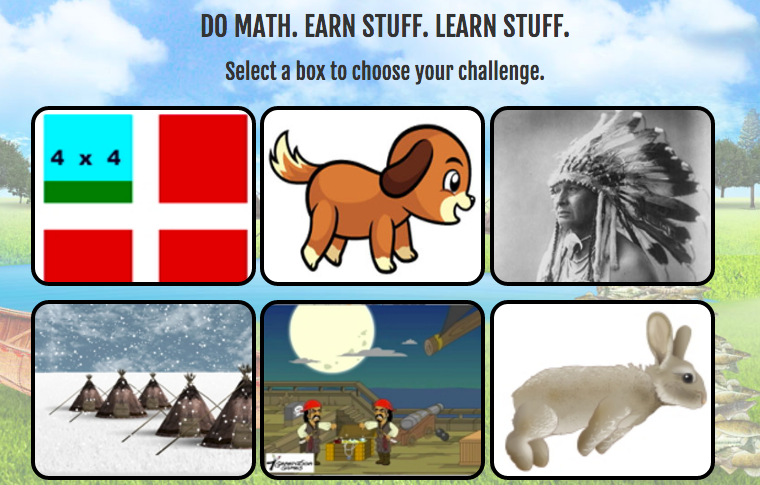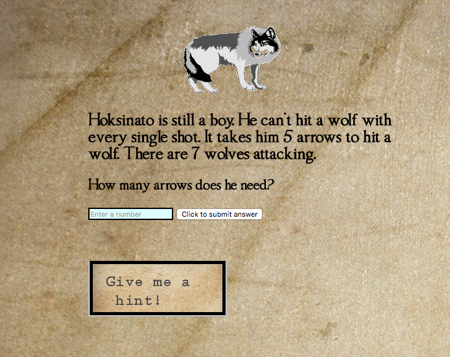You are supposed to individualize instruction. We all know it. In some cases, when students have special needs, we are legally required to do it, have meetings about it. Yet, it’s difficult when you have 40 students in a class. Or maybe you only have 20 students but one is homeless, one has autism, one has a parent who is addicted to meth and is living with Grandma, one has Fetal Alcohol Syndrome and 15 are anywhere from one to four years below grade level.
Here are 4 ways our games can help.
- Enrichment for advanced students – that one child who is far ahead of the class, instead of giving her more worksheets to do after she finished her math assignment for the week and having her come home saying that she hates math (yes, this really happened), say, “Great job! You can play these games on the computer!”
- Individualized instruction for students with special needs– you have a student in your sixth-grade (or seventh-grade or ninth-grade) class who has not mastered multiplication, or fractions, or sixth-grade statistics standards. You know from your special education courses (if you took it from me) that you want to do something that is age-appropriate. What could be more age appropriate for middle school and high school students than video games? Take a look at the image below from Fish Lake and you can see that this is not a “kiddie” game.

- In remedial classes – maybe your whole class is a remedial class. Let me recommend Fish Lake, Spirit Lake and Forgotten Trail for middle school through grade 10. Making Camp covers the same math concepts as Spirit Lake but it has a younger look, so I would recommend that for grades 3-5 (maybe grades 6 or 7 – you know your students so you should decide).

- As a reward – maybe this isn’t as much individualization but maybe it is. Different students like different things. Spirit Lake is an adventure game. Making Camp is more of a collector game. Students can choose what to play, both by type of game and difficulty level. Whether because your whole class was on task, because they all passed a math test or just as a reward for any particular student, being allowed to play our games is a reward (come on, compared to reading a math textbook and writing the answers in your notebook, it totally is).



You’re gonna call me a hater. But I’m not! But I think some of what you are saying is a little unrealistic. Children are smart! They will understand that there is a difference between an educational game and Call of Duty. So when you try to tell them that playing an educational game for the 4th time that week is a reward for doing well in school they are going to disagree with you.
I wouldn’t bother typing this if I wasn’t cheering you on. If I didn’t care I wouldn’t bother.
My theory is to ‘sneak’ the educational portion of the game into the game itself. To help children learn without having them realize they are learning. Kerbal Space Program is a prime example of a fun lego building/ physics simulator – that also teaches you astrophysics and astronomy at the same time.
Older people like us understand the value of the educational portion of a game but kids just want an experience that is satisfying. They don’t usually care if they are learning anything or not.But the good thing about games is that usually satisfaction and learning goes hand in hand. Whether it’s lion cubs playing in the savaana or a young judoka taking a lesson with their idol.
My point is I’m cheering you guys on, but let’s keep in mind that children have their own agenda when it comes to how they spend their time. We have to target our games to fit into their framework rather than wishing they’d jump on board with our more mature idea of what it is they should want to do.
Thanks for your comment, Billy. I think it goes back to the idea of individualizing instruction and knowing students/ children as individuals. When one of our teacher-consultants did a classroom survey and asked students what they liked best about one of our games, she was surprised how many said, “math”. For some kids, math is their favorite subject. Now, I’m not going to argue that is the majority, but that’s my point, some kids LOVE the math part or they love shooting the wolves and don’t mind doing the math to get to that part or they just want to get a higher score than the next kid. I’ll have to check out the game you mentioned.